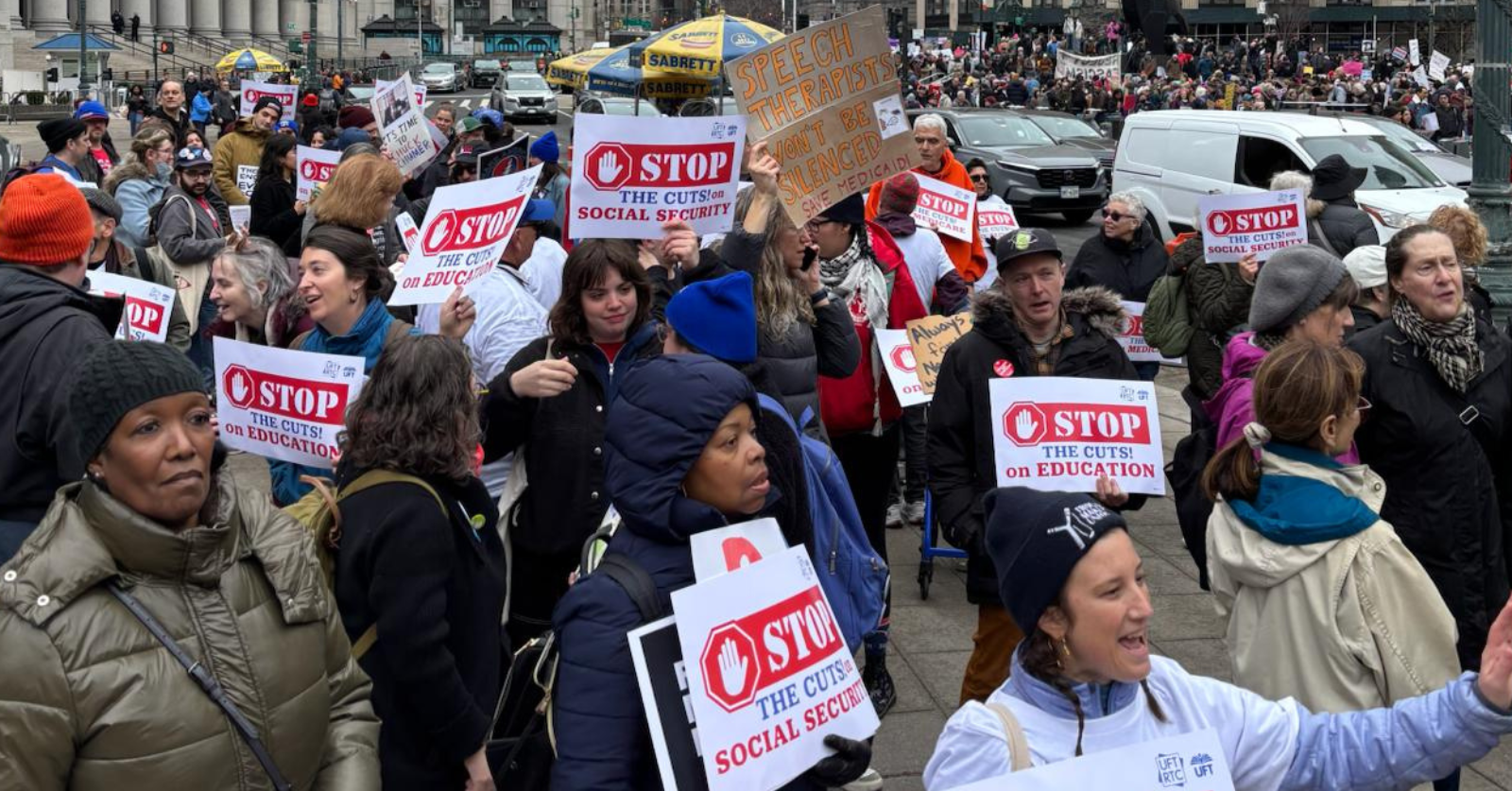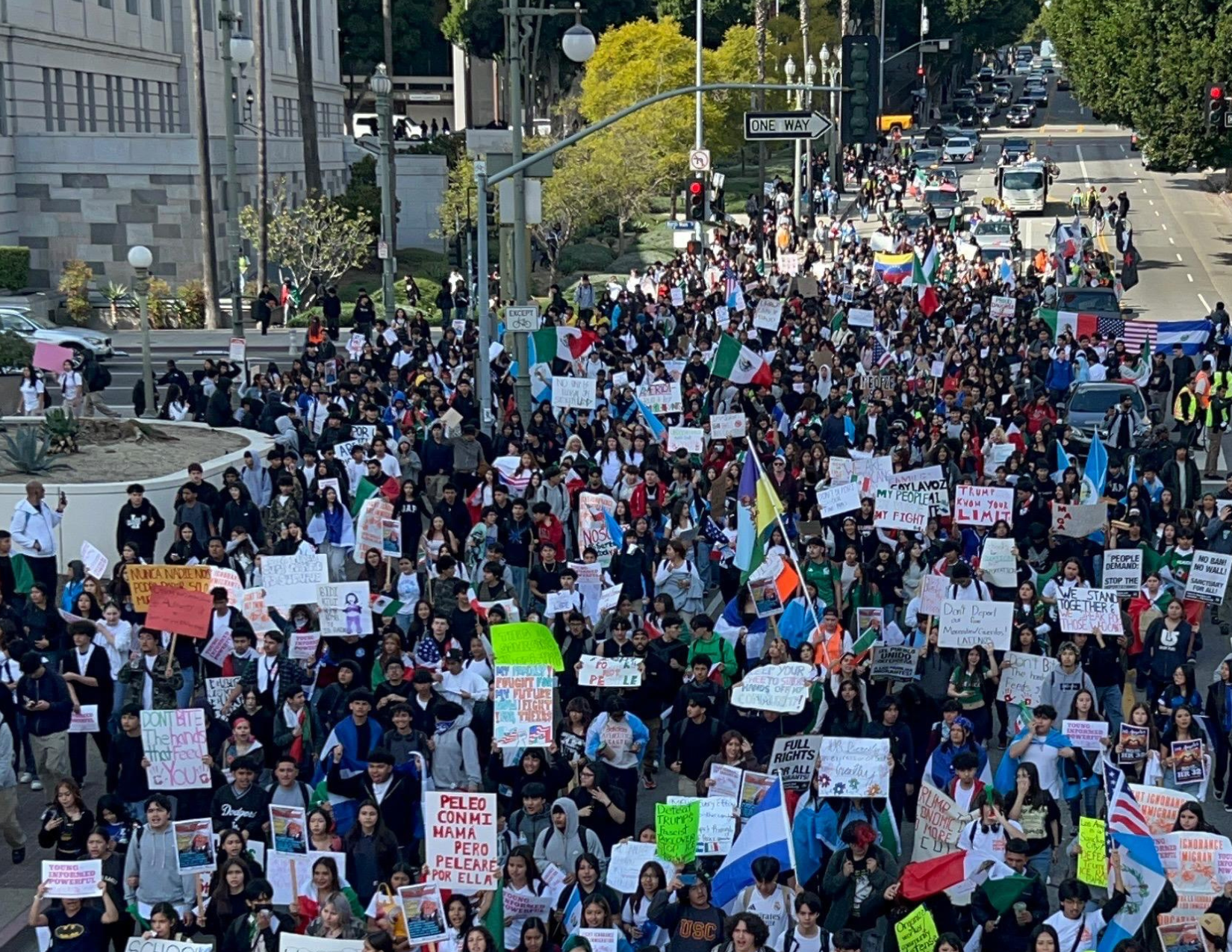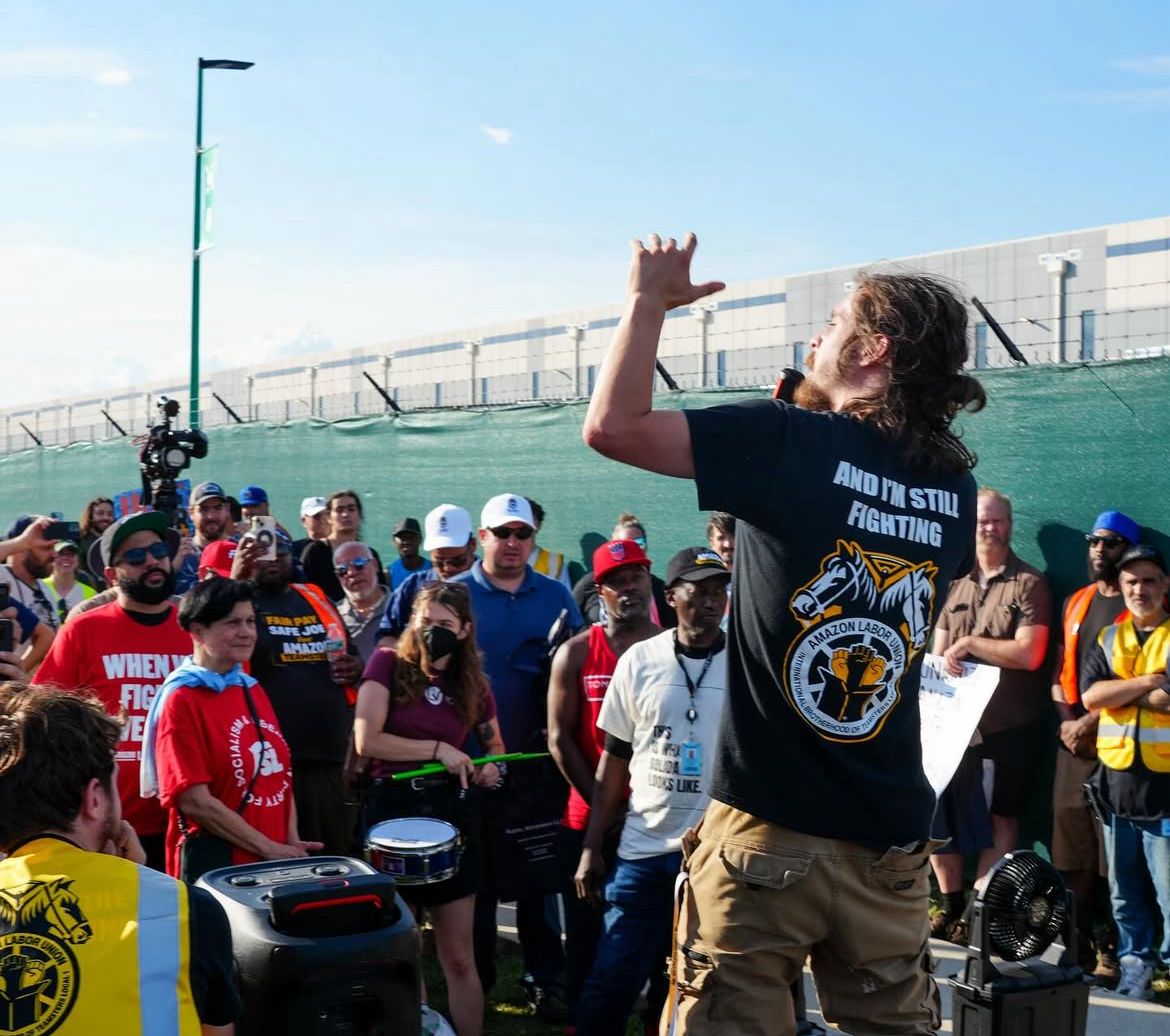After four months of campaigning, internal leadership elections have concluded in one of the largest union locals in the country with over 200,000 members, the United Federation of Teachers (UFT) in New York City. The Unity Caucus, the long-time leadership of the union and the political home of American Federation of Teachers (AFT) President Randi Weingarten, won re-election with 54% of the vote, with around 29% turnout.

Unity’s support has fallen from 84% to 54% since 2019. Data from Jonathan Halabi.
This represents the lowest vote share the incumbent group has ever received, down from its previous record low of 66% three years ago. At this rate, Unity’s complacent control over the union is anything but given for the next election in 2028, creating an impetus for change leading into our next cycle of contract negotiations.
Two competing opposition slates, A Better Contract (ABC) and the Alliance of Retired and In-Service Educators (ARISE), came up short, receiving 32% and 14% respectively.
(To prevent dissidents from gaining seats, UFT elections are now done by slate, with the plurality-winning slate taking 100% of the seats for each division, such as elementary, high schools, or retirees.)
We participated in the ARISE campaign and while we didn’t get the outcome we wanted, this election was important for two reasons. First, for educators experiencing a decline in working conditions, the election presented an alternative to the status quo, and created opportunities for thousands of members to talk at work about the union and the jobs they want to fight for. And second, the UFT has tremendous untapped power, badly needed to fight the Trump assaults on public education and democratic rights.
Ripe for Change
Unity Caucus, which has run the union since its founding in 1960, epitomizes a business unionist strategy. This means transactional relationships with Democratic Party politicians in exchange for better wages and benefits, demobilizing members at the school level, and ceding ground on working conditions for teachers and social justice issues for the city’s diverse student population. Unity has governed the union as a disciplined patronage network in which most staff and reps are selected more for allegiance to the caucus rather than support from the members. The union’s democratic processes at anything above the school-site level are largely symbolic.
In recent years, Unity’s strategy has failed to deliver on even the bread and butter, “winning” sub-inflation 3% annual raises in the previous contract and failing to lift paraprofessionals out of poverty wages. UFT members hired after 2012 are slotted into a significantly worse pension plan known as Tier VI, a concession which costs a teacher hired today over $1 million in lost savings by the time they retire – all after working eight years longer than the prior tier. Healthcare plans have worsened, and UFT’s leaders infamously tried to privatize retiree healthcare in 2021 (more on this below).
UFT leadership has declined to mobilize members to protect our working conditions, as administrators push canned corporate curricula in reading and math. These scripted lesson plans try to degrade the teacher into something more like an assembly-line automaton and the students into a passive, homogenous recipient of instruction. At most, incumbent President Michael Mulgrew occasionally reports that he is working on fixing the curriculum mandates — and that they’re making progress!

Unity Caucus, the only leadership the UFT has had in its history, appealed to members’ comfort with the familiar.
Growing Opposition
It was in this context that ABC and ARISE collectively won the largest share for reform in UFT history, both promising to put members in the driver’s seat of the union, wage an aggressive contract campaign, and reverse decades of givebacks.
Before the election, the members of what would become ABC and ARISE (including many members of the 2022 United for Change opposition slate, or UFC) had discussed running a unified slate but ran up against a number of obstacles. Unable to agree on platform planks or organizing approaches, they ran separate campaigns. Given the political clarity of ARISE and the distance between the two slates on key issues, we think this was ultimately the right choice, despite the fact that it likely foreclosed the possibility of ousting Unity in this election cycle.
ABC, which came in second place, was formed out of elements of UFC, as well as decades-long Unity insiders who have found themselves on the outs of the ruling caucus in the past couple of years. Amy Arundell, ABC’s presidential candidate and a 25-year UFT staffer, benefited from her mostly positive reputation as a district representative supporting UFT chapters in Queens. She was likely ABC’s main selling point.
However, along with ABC’s candidate for secretary, Paul Eagan, who served on staff beginning in 2006, including a stint as UFT’s political director, Arundell and other ABC leaders share responsibility for the union’s sluggish campaigns and lackluster contracts that they only recently started campaigning against.
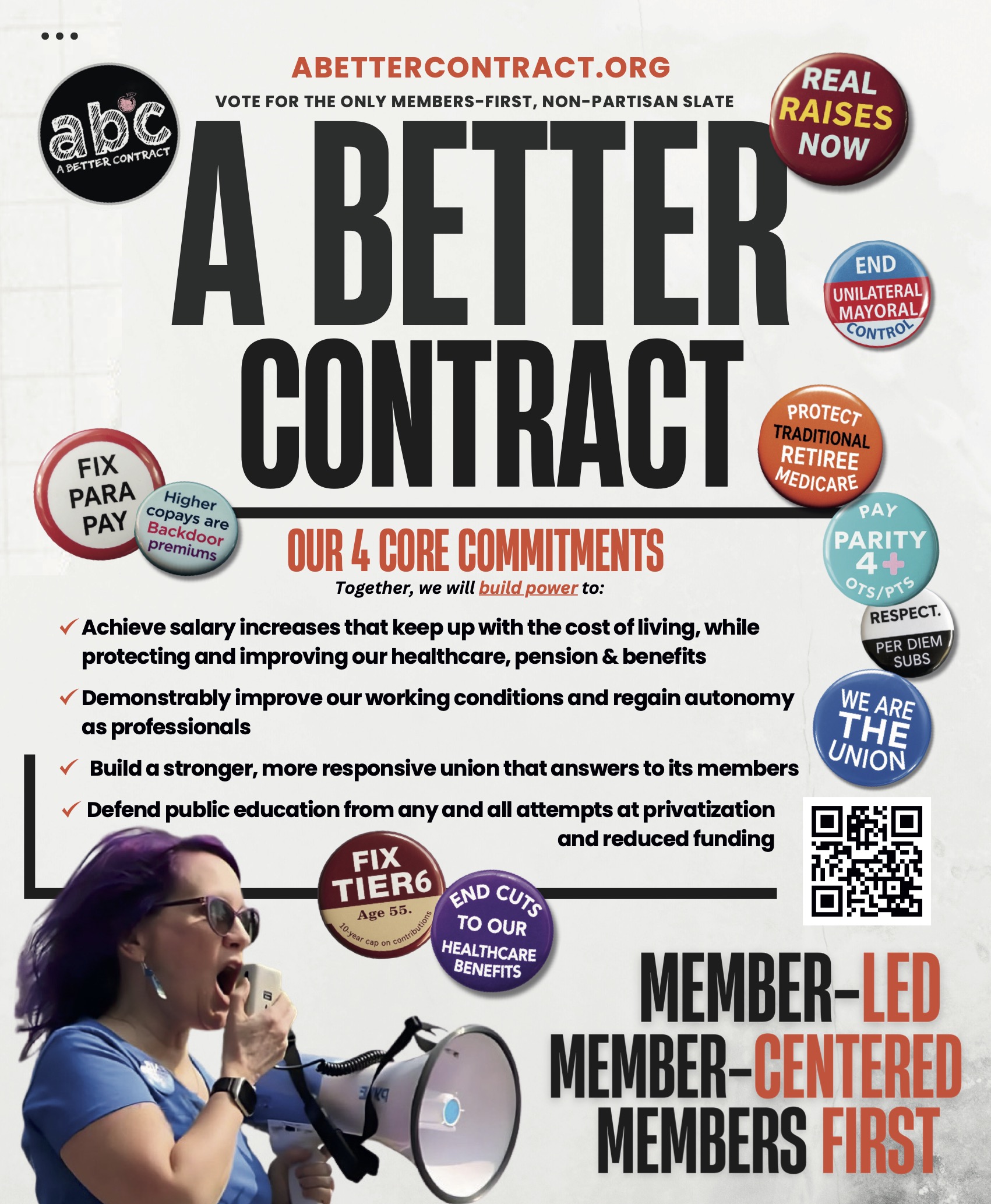
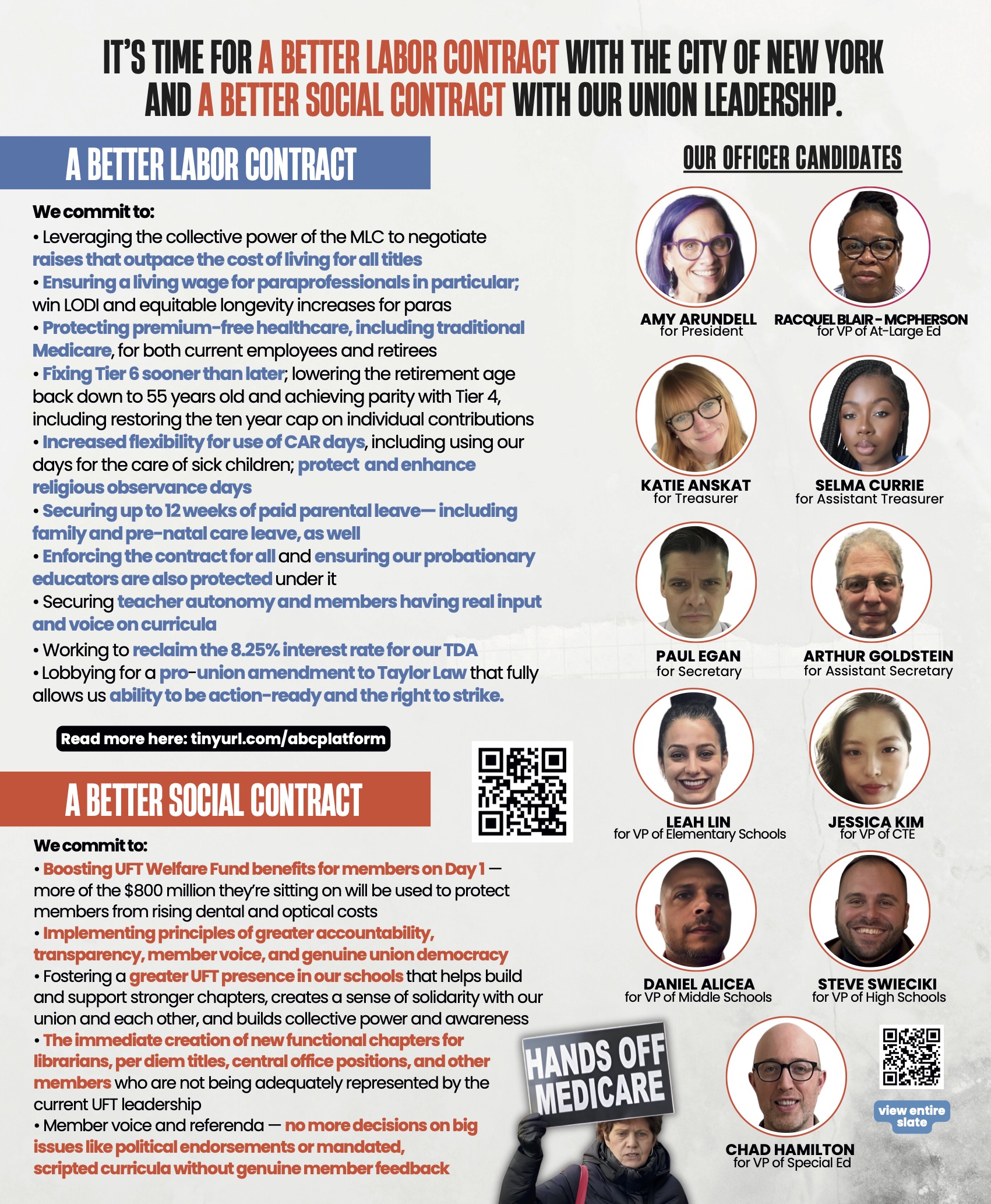
A Better Contract (ABC) flyer featuring presidential candidate Amy Arundell.
But by bringing together Arundell’s name recognition with a host of established critics of the UFT leadership — who run popular blogs and Instagram accounts and contribute vigorously in the 50,000-strong UFT members’ Facebook group — ABC successfully polarized the campaign and won thousands of votes by appearing as a viable opposition.
ABC also appealed to a growing number of MAGA-voting and anti-vax members who object to UFT’s liberal politics. UFT officially supports Democratic politicians and issues like immigrants’ rights while criticizing Trump and the GOP. At times ABC suggested it was actively courting right-wing voters and criticized other groups in the union for their “radical” and “social justice” politics. (More on this below.)
We supported ARISE, a coalition of three caucuses: the Movement of Rank-and-File Educators (MORE), New Action Caucus (NAC), and Retiree Advocate (RA), all of which had also participated in the United for Change campaign in 2022.
Despite coming in third, we in ARISE nearly won the High School division with 34% of the vote compared to Unity’s 38%. High School was the only division where, combined, ABC and ARISE defeated Unity. (See ARISE activist Jonathan Halabi’s reporting for detailed counts from this and past elections. In the coming weeks we will get more detailed reporting, and you can follow Jonathan’s blog for that.)
ARISE was the only contender whose Administrative Committee slate was composed entirely of rank-and-file educators and retirees and not helmed by longtime UFT staff. Our leading candidates were far from inexperienced, however. Most have spent years as elected chapter leaders (school-based stewards), organizing at work to enforce the contract and protect members’ rights. ARISE combined a vision of a bottom-up, democratic union, a powerful well-funded organizing department to shore up chapters at the school and district levels, and progressive politics that see our working conditions as our students’ learning conditions. We drew inspiration from successful teachers’ struggles in Chicago, Los Angeles, West Virginia, and Massachusetts and emphasized an organizing approach: open bargaining, progressive politics, and an aggressive contract campaign that doesn’t shy away from strike-readiness.

ARISE flyer distributed in educator mailboxes across NYC.
A major issue animating the ARISE base was UFT President Michael Mulgrew’s attempt to privatize and undermine retiree healthcare in 2021. The Medicare Advantage proposal galvanized retirees who saw the scheme for what it was, and a group of activists called Retiree Advocate (RA) mobilized against it. In 2024 RA won leadership of the 72,000-member retirees chapter. Unity, and therefore the UFT, then abruptly dropped support for Medicare Advantage and have since expressed regret, a major win for UFT retirees.
Retiree Advocate activists have since used the retirees chapter as a base of operations for activism in the union. This includes launching the UFT Labor Solidarity Project, connecting retired and in-service UFT members to support workers in our union and beyond, and in particular to join the fight against Trump’s Project 2025. This year RA joined with MORE and NAC, both long-time rank-and-file reform caucuses within the UFT, to form ARISE.

We’re proud that Unity adopted some of ARISE’s proposals during the campaign — including 12 weeks paid family leave, higher paraprofessional pay, and rallying against Trump’s attacks on public education and immigrants. After the votes were counted the ARISE campaign called on UFT leaders to listen to members’ concerns expressed in the election results and “keep the promises they made over the course of the campaign: Fix Tier VI, raise paraprofessional pay, and protect and improve our healthcare benefits, among others.”
Why Unity Won
While we take a glass-half-full view of the election — a record number of votes for opposition forces puts the union on the path to major changes — how do we explain Unity’s victory? First, the UFT is a massive union, with 200,000 members in more than 1,500 schools serving nearly a million students. For comparison, Alexandria Ocasio-Cortez won a seat in Congress by winning the 2018 Democratic primary with a mere 17,000 votes. To reach a majority of the 58,000 UFT members who voted last month, much less increase turnout to more than a paltry 29%, opposition caucuses would need a massive operation that simply has not yet been developed.
ABC relied heavily on “airpower,” leveraging pre-existing email lists, big name recognition, and UFT-orbit social media influencers to get the word out. ARISE’s admirable social media efforts reached a smaller number.
ARISE did punch above its weight in the ground game, reaching hundreds of school buildings with flyers about the campaign while hosting regular trainings and phonebanks for activists. But while face-to-face organizing is ultimately the most meaningful, it is only possible at the schools where we had an on-the-ground presence. ARISE recruited over 500 candidates to run for AFT delegate positions from 230 schools (about 14% of total schools) plus retirees, a major feat and likely the largest such group recruited for an opposition caucus in UFT history. Our on-the-ground, in-school presence was stronger than our presence among retirees. While ARISE got 14% of the votes overall, we won 20% of in-service (i.e., not retired) teachers (compared with 53% for Unity and 28% for ABC), and 34% of high school teachers (compared with 38% and 28%). ARISE did worse among non-teacher in-service members, such as paraprofessionals, with 11% compared with Unity’s 58% and ABC’s 38%.
Meanwhile, Unity could rely on a general incumbency bias as well as low information and turnout. Many members were understandably hesitant to throw out the “devil they know” for a group of well-meaning but untested teachers. Mulgrew, after all, had run the union for decades — not perfectly, but at least we still have a union. Indeed, some amount of ABC’s support came from teachers frustrated with Unity who appreciated that ABC included some longtime union higher-ups who knew their way around the office.
Unity’s 53% win among nearly 26,000 retiree voters is particularly significant given Unity’s loss in the 2024 retiree chapter elections. There was a decrease in turnout — likely due to a single-issue anti-Medicare Advantage voter bump in 2024 — and almost 4,000 retiree voters returned to Unity in this election who may have read Unity’s about-face on Medicare Advantage as them “coming to their senses,” instead of a win for the opposition. However, it was still an 18-point loss of retiree support for Unity compared to 2022 when they won 71% of retirees.
Meanwhile, 35% of retirees voted for ABC compared with only 12% for ARISE, despite RA formally joining the latter. This was likely due both to division among retirees in the formation of ABC and ARISE, and the vocal support of ABC by Marianne Pizzitola, leader of the NYC Organization of Public Service Retirees, a cross-public-sector union platform. While she herself is not a UFT member, Pizzitola’s social media presence is uniquely popular among retired teachers, especially since her significant role in the fight against Medicare Advantage.

Note: The 2024 Retired Teacher Chapter elections, lost by Unity 37-63, are not included in this chart tracking union-wide and top officer elections. Data from Jonathan Halabi.
Union Politics or Stick to “Bread and Butter”?
One contentious issue raised in the campaign: should unions be political? ARISE was the most outspoken against Trump’s Project 2025 throughout the election, consistently mobilizing members to the Hands Off rallies against Trump and in defense of immigrants and LGBTQ students. While UFT officially followed suit, endorsing some of these rallies, ARISE activists, especially retirees, were often the most visible presence from the union.
ARISE also put forward a resolution to the union’s thousands-strong Delegate Assembly (DA), nominally the union’s highest democratic body and composed of school-level representatives, to coordinate a “Hands Off Our Schools” campaign. This would mobilize members against attacks from the federal government. Due to the undemocratic structure of the Delegate Assembly — over an hour of each meeting is reserved for reports from officials and less than half of that, sometimes only 15 minutes, for discussing delegates’ proposals — the resolution has still not been debated though it was introduced in February.
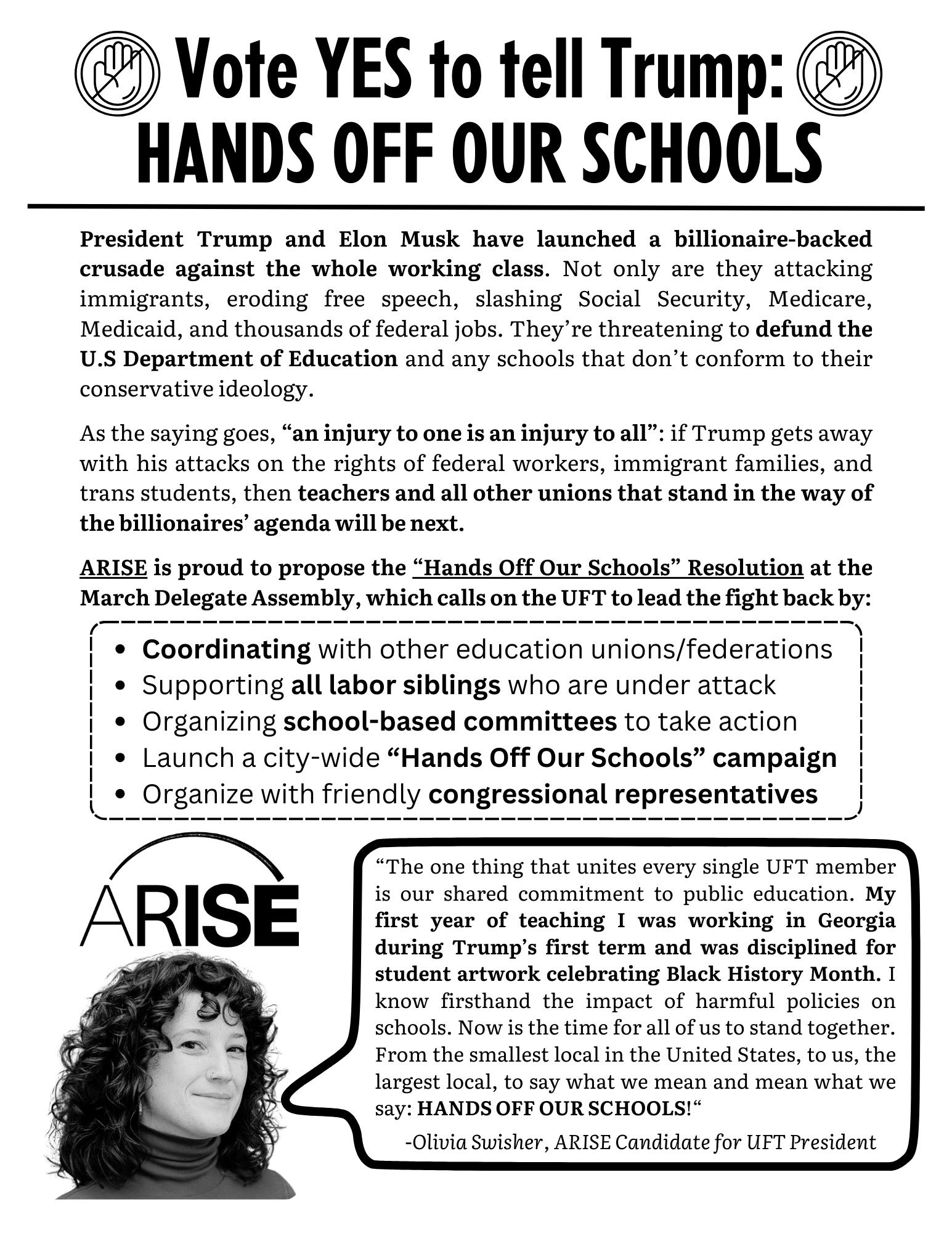
ARISE flyer supporting the “Hands Off Our Schools” resolution distributed to UFT delegates.
The DA did, however, debate and narrowly pass a Unity-backed resolution which vaguely decries “outside influence” in the UFT elections. While the exact targets of this proposal were never clarified, one was suggested by a redbaiting flyer distributed the same day the resolution was introduced, with the title “? DSA = MORE = ARISE ?” Another likely target, on the opposite end of the political spectrum, was Marianne Pizzitola, the popular retiree influencer.

Flyer denouncing “outside influence” in the UFT elections.
At the same time, ABC has remained effectively silent about the attacks from the Trump administration. ABC’s statement on the firing of federal workers did not mention the name Trump and instead said that they “recognize that leadership decisions at the highest levels come with difficult choices.” According to an outgoing UFT executive board member and ARISE candidate, ABC also attacked ARISE’s call to make UFT strike-ready, dropped support for the New York Health Act (single payer healthcare), and touted the endorsement of a right-wing teachers group which opposes UFT’s support of Democrats and school policies like vaccine mandates.
In a public address meant to build support for ABC, Pizzitola argued that there’s no place for “social justice” politics in a union. (It’s unclear if her target here was the progressive ARISE, the liberal Unity, or both.) While “radical” activists should have their own “social club” on the side to pursue their politics, she feels the union should focus instead on “bread-and-butter issues,” namely wages and benefits, the things that “actually can have an impact on your every day.” A student of history, Pizzitola invoked early U.S. labor leader Samuel Gompers and his apolitical, “pure and simple” unionism.
But Pizzitola’s group has actually gotten political before. For instance, they endorsed Republican City Councilmember Vickie Paladino who promised to “restore our education system” by “ending poisonous Critical Race Theory,” expanding charter schools and voucher programs, and “breaking the back of the corrupt and reprehensible teachers union.”
While there is a nuanced debate to be had among activists about how unions should approach politics and social justice, we feel that ignoring them altogether is a mistake. Gompers was wrong to avoid politics, let alone uphold racist, whites-only, craft-unionism. Especially when the Trump administration is attacking public education, immigrants, and our democratic rights, teacher unions have a central role to play in fighting back. Indeed, we do not have the luxury of being apolitical when unions and public schools are so threatened by the federal government. We would therefore replace Pizzitola’s “bread-and-butter” with a better union watchword: solidarity. Trump’s invasion of Los Angeles this week, targeting immigrants and union leaders alike, is but more confirmation of the truth of the old saying, “an injury to one is an injury to all,” and the warning, “First they came for the immigrants…”
We’re proud that ARISE was able to walk and chew gum in this election, supporting progressive politics and mobilizing against Trump while championing the day-to-day issues facing UFT members at work.
Future of Reform in UFT
The fight is far from done. In the upcoming city and state budgets we expect massive fights over education funding, and UFT contract negotiations are right around the corner. ARISE activists plan to be involved in all these fights. According to presidential candidate Olivia Swisher, “All losing means is that we will continue to do what some ARISE members have been doing since the ‘60s: pushing the needle on union democracy to make a member-led and student-centered union.”
In order to fundamentally change the union and our jobs while winning better schools for New York students, it isn’t enough to run a triennial election, no matter how strong the campaign. Had the opposition won top leadership of such a large union, we would have needed to draw on respected, on-the-ground educator-organizers across at least a majority of schools in order to generate the power needed to implement our ambitious platform. Kevin Prosen, a veteran UFT chapter leader and founding member of MORE, argued that “we won’t be a credible contender for leadership of the whole union” until we’ve built strong chapters in hundreds of schools. “Our real work,” he told The Call, “remains unchanged: recruit more chapter leaders, win more chapter elections, build school-level union power, and deepen our experience in running the union at more local levels of union power.”
Enthusiasm for this work runs high in the ARISE camp, where members are upbeat despite their third-place showing. A new coalition of activists came together around a platform for major changes in our jobs and our union, and this can be the basis for a longer-term movement. And Unity’s 54 percent victory is nothing short of a crisis for the ruling clique.
When asked what was the most important thing ARISE fought for and is going to fight for, Swisher, a middle school art teacher and chapter leader, responded, “Organizing. The federal, state, and local governments will never take us seriously unless we are organized to use our full power.” Already, Swisher and other ARISE activists are slated to lead a Labor Notes-inspired UFT Secrets of a Successful Organizer training, hosted at UFT headquarters, on June 14.
In the midst of the ongoing crises in public education and federal government’s attacks, we remain hopeful for the future of the UFT and look forward to helping build the union we know it can be.
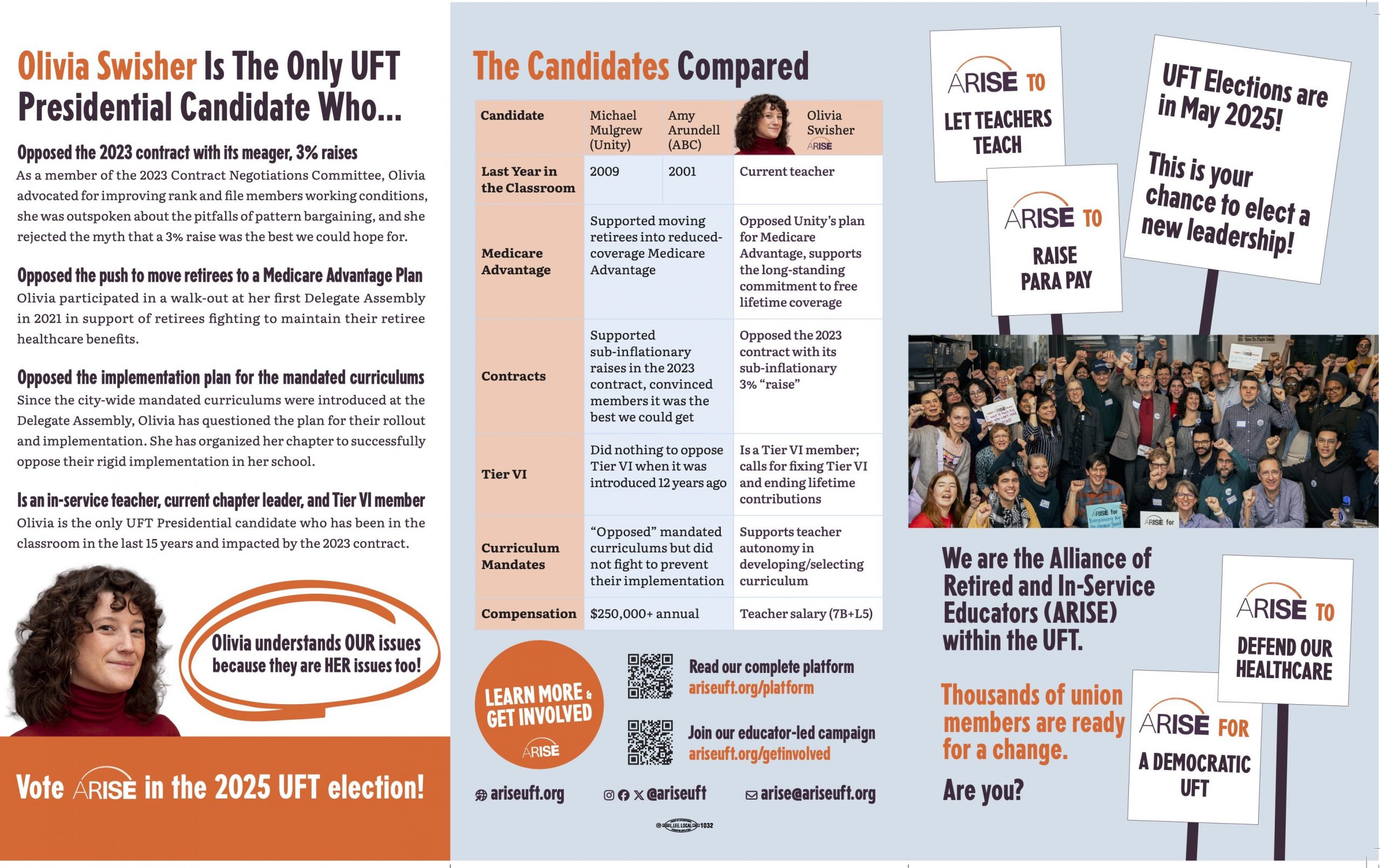
ARISE flyer comparing the three leading candidates.

